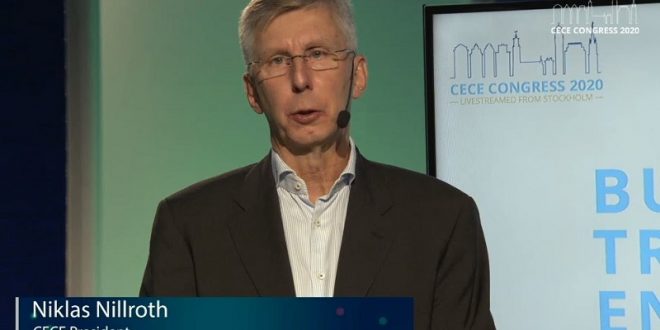“It is time to see opportunities and focus on recovery. It is time to look forward and see where innovation sets the path for growth. It is time to take leadership in sustainable construction technology and in digitalisation to guarantee full power in achieving Europe’s Green Deal goals. We must keep building trust and enable innovation.”
With these words CECE President Niklas Nillroth opened the CECE Congress 2020.
This year’s CECE Congress was short. No personal meetings, no get-together, no small talk, or leisure. Nevertheless, an amazing number of 650 participants from around the world joined the livestreamed conference on 8th October to profit from experts’ views on the post-COVID economic recovery and the opportunities offered by sustainability and digitalisation. During the event a newly produced CECE documentary on sustainable construction was premiered. Moreover, the event looked at the current regulatory challenges and presented the economic update on the construction equipment markets.
A panel of high-level relevant speakers, professionally moderated by Malcolm Larri from the TV studio in Stockholm, painted a picture of a forward-looking industry working together to deliver for society. CECE Congress highlighted that successful digital transformation depends on a holistic view and a proper economic structure based on trust in the role of public authorities and in the capacity of companies to innovate.
CECE President underlined that the EU industry is committed to stay in the technology lead. Understanding the needs of customers and suppliers is key. Working closely with policy makers and strengthening collaboration with academia leads to building trust and further enables innovation serving the EU society.
During an opening panel debate, CECE Secretary General Riccardo Viaggi reminded participants about the historic importance of the European Recovery Plan in making available 750 billion Euros of fresh finance for economies to kickstart investment and growth:
“We need the national Recovery Plans to prioritise construction and infrastructure projects, which create jobs and prosperity at local level” concluded Riccardo Viaggi.
Also speaking at the CECE Congress, Kerstin Jorna, Director General of the Directorate-General for Internal Market, Industry, Entrepreneurship and SMEs at the European Commission pointed that construction plays a decisive role in the European economy. 30 % of all the energy used in the EU is for heating and cooling, 40 % of emissions come from existing buildings and 30 % of the total waste is construction waste. In this setting, the EU Renovation Wave to improve the energy efficiency of buildings in Europe is the cornerstone of construction’s recovery.
“I invite you to ride the wave; the Renovation Wave is your sector’s industrial strategy”, concluded Kerstin Jorna.
A newly produced CECE movie highlighting sustainable construction showed what industry means by the holistic approach to sustainability. The documentary explains the interdependency between machinery efficiency, process efficiency, operation efficiency and alternative energy sources, the so called ‘4-pillar approach’ to decarbonisation. View the video here.
The impact of COVID-19 on the construction equipment sector is immense. According to Chris Sleight, Managing Director of Off-Highway Research, the revised forecast for global equipment sales (units) in 2020 is -16 %. This was around -5% before the pandemic. The economic environment will be weak and the performances will depend on which recovery actions will be put in place by national and regional authorities to relaunch spending and economic activities.
The CECE Congress 2020 was sponsored by Danfoss, Hammerglass, CheckMobile and Configit. KHL Construction Europe was the official media partner of the event.
Source: CECE, the Committee for European Construction Equipment Press
 Constructionshows
Constructionshows
